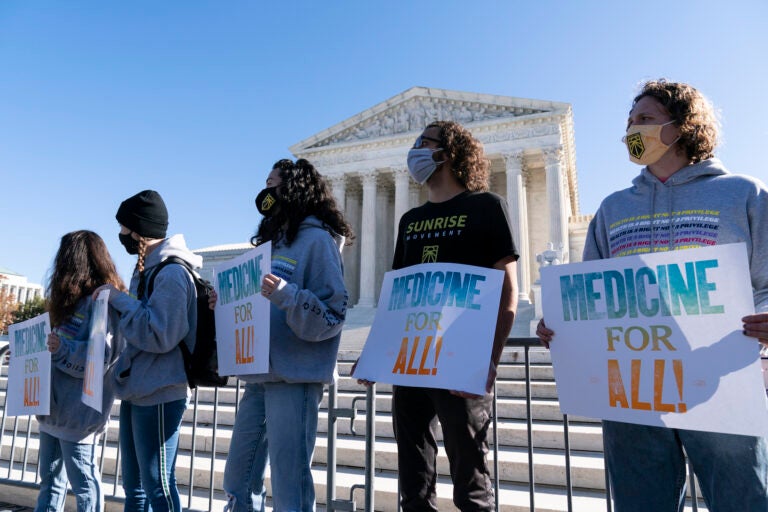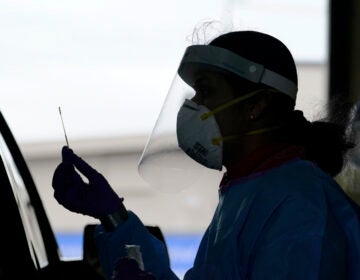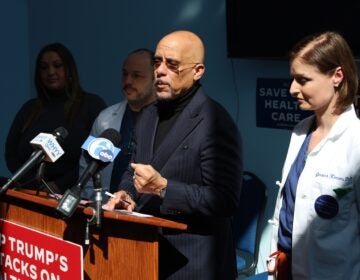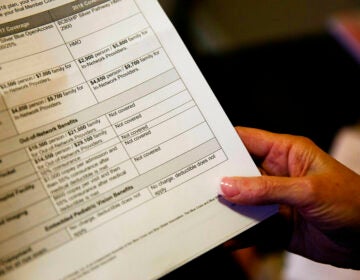‘It’s a paralyzing fear’: More than 1 million in Pa. would lose coverage if Affordable Care Act is overturned
The Supreme Court heard the latest challenge to the law Tuesday. If declared unconstitutional, hundreds of thousands in the state would lose health care.

Demonstrators hold signs in front of the U.S. Supreme Court as arguments are heard about the Affordable Care Act Tuesday, Nov. 10, 2020, in Washington. (AP Photo/Alex Brandon)
Amy Raslevich received a very important piece of paperwork Tuesday from her doctor at UPMC in Pittsburgh. It was a certificate of survivorship, noting that after three years and millions of dollars worth of treatment and surgeries, she was officially cancer-free.
She would have liked to celebrate, but instead she described a pit in her stomach. That’s because Raslevich knew that in just a few hours, the law that saved her life was being challenged before the U.S. Supreme Court.
“I have a preexisting condition now for the rest of my life,” said Raslevich, who is currently earning a degree and is worried about eligibility for employer-funded health insurance when she reenters the labor force. “It’s a paralyzing fear.”
If the entire Affordable Care Act were to be declared unconstitutional, millions of Americans would lose health care amid a raging pandemic, including hundreds of thousands of Pennsylvanians like Raslevich.
Because of the annual limits and lifetime limits imposed by the ACA, she said, her family was able to afford her treatment.
“You don’t know what you need until you need it,” she said. “All that small print that you just sort of sign, especially if you have an employer plan — without the ACA, the protection you think is there may not be.”
Passed in 2010, the Affordable Care Act has transformed the U.S. health care system. It dramatically increased the number of people eligible for health insurance through its optional Medicaid expansion program, which Pennsylvania enacted in 2015 and in which 39 states now participate.
More than 725,000 new individuals were eligible for expanded Medicaid in Pennsylvania alone. Another 300,000 purchase private insurance through the insurance “exchange,” and nearly all of those people (87%) receive subsidies for their plans. According to U.S. Census data, the rate of uninsured Pennsylvanians was nearly cut in half after the commonwealth expanded Medicaid coverage — it fell from 9.7% in 2013 to 5.5% in 2017, although the pandemic and related job losses have brought that rate considerably higher.
For many of the health issues plaguing Pennsylvania in particular, the law has helped provide treatment. Medicaid expanded in the state at the same time as opioid overdoses began to surge here. In 2019, 135,000 people received substance use disorder treatment through Medicaid expansion, according to U.S. Sen. Bob Casey.
The law also protects 5 million Pennsylvanians with preexisting conditions, which can include anything from pregnancy to acne — and now, COVID-19.
Tuesday’s arguments before the high court
It appears the most meaningful elements of the Affordable Care Act are likely to survive the law’s latest challenge in the Supreme Court.
The case, in which Texas and 19 other states sued the federal government, hinges on three layers of questions. The first is whether the plaintiffs had standing to sue — in other words, if they have been actually harmed in any way by the ACA. The second is whether the portion of the law requiring every American to buy health insurance, also known as the individual mandate, is constitutional. That requirement was rendered moot when Congress zeroed out the penalty for not purchasing insurance in 2017. The third question only comes into play if the individual mandate is found to be unconstitutional: Does dropping the requirement to purchase insurance cause the whole law to collapse, or is that element “severable” from the broader legislation?
All nine Supreme Court justices were present during Tuesday morning’s oral arguments via teleconference, including newly appointed Justice Amy Coney Barrett. Considering how the high court ruled in the last two challenges to the ACA, Coney Barrett’s replacing the late Justice Ruth Bader Ginsberg is the only real reason the scales in the case could be tilted toward striking down the law. Coney Barrett had written in favor of the dissenters in past challenges.
During arguments, Coney Barrett and several of the other conservative justices, including Neil Gorsuch and Clarence Thomas, expressed concern about the issue of legal standing, not uncommon within conservative jurisprudence.
The question of the individual mandate’s constitutionality has come up before.
Back in 2012, the ACA was challenged in the Supreme Court for the first time on the grounds that the individual mandate was unconstitutional. The court upheld the law — the majority ruled that the penalty could be considered a tax, which Congress is authorized to levy.
After Congress zeroed out the penalty for not buying insurance in 2017, Republican officials sued again on the grounds that the penalty could no longer be considered a tax, since it didn’t generate any revenue for the government.
In Tuesday’s arguments, it was not entirely clear which way the justices would swing. Attorneys for the defense argued that because there was no threat of enforcement for a penalty-less tax, imposing it was not outside the realm of Congress’s powers. The other side argued that the mandate was still a command to buy insurance, whether there was a penalty or not.
“The only thing that’s changed is something that made the law less coercive,” Justice Elena Kagan pointed out to Texas Solicitor General Kyle Hawkins. She asked Hawkins to consider if the mandate has always been unconstitutional for a group of mostly poor people, who have always been subject to it but never had to pay anything.
“Doesn’t it seem exactly backwards … to say that those people who never had to pay a thing were subject to a command when people who did have to pay, who felt the coercive power of government, were not subject to a command?” Kagan asked.
Hawkins said the poor Americans and members of Native American tribes who never had to pay a penalty had been subject to an unconstitutional law all along.
Even if the court finds the individual mandate to be unconstitutional, the ACA could continue if the justices believe the mandate is not the crux of the entire law.
In the 2012 case, attorneys argued that the individual mandate was indeed central to the law: If healthy people weren’t forced to buy insurance, there would not be enough money in the overall pool to pay for those who can’t afford it. But after Congress zeroed out the penalty, the law did not collapse, largely due to subsidies awarded based on income to those who did buy into the exchanges.
“The ACA’s preexisting condition protections would result in a premium ‘death spiral’ unless healthy people are encouraged to enroll,” wrote Larry Levitt, the Kaiser Family Foundation’s executive vice president for health policy. “That can happen with a stick (mandate) and/or a carrot (premium subsidies). We’ve learned that the carrot is more powerful than the stick.”
Chief Justice John Roberts and Justice Brett Kavanaugh both seemed skeptical that there was a good argument for why nixing the individual mandate should mean bringing down the entire law.
“I tend to agree with you that this is a very straightforward case for severability under our precedents, meaning that we would excise the mandate and leave the rest of the act in place,” Kavanaugh told attorney Donald Verrilli, representing the U.S. House of Representatives.
Assuming that the court’s three more liberal justices agree, that would save the law from collapse. A decision is not expected for several months.

Get daily updates from WHYY News!
WHYY is your source for fact-based, in-depth journalism and information. As a nonprofit organization, we rely on financial support from readers like you. Please give today.






